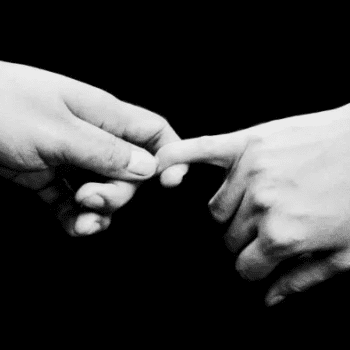 Yesterday reader Mindy left a comment to The Laziest Christian in the World that I thought worth closely examining, because it so perfectly captures so much of what I know repels so many from Christianity. Mindy is easily one of most consistently thoughtful, patient and articulate commenters on this blog. I’m hopeful she won’t mind having one of her comments be the basis for this little exercise.
Yesterday reader Mindy left a comment to The Laziest Christian in the World that I thought worth closely examining, because it so perfectly captures so much of what I know repels so many from Christianity. Mindy is easily one of most consistently thoughtful, patient and articulate commenters on this blog. I’m hopeful she won’t mind having one of her comments be the basis for this little exercise.
Mindy’s comment begins at the next paragraph. My responses to it are in brackets.
I gotta go with tildeb on this one. [Ah, commenty love. What’s not to like about that?] I appreciate your reminder, John, that “no one Christian is more saved than another”—but that right there gets to the heart of my problem with Christianity. [Oh, no! Trouble ahead!] As long as you “believe,” your afterlife is secure—no matter how many you trounce upon along the way. [Ah. So, this points to a mistake in what I wrote. I should have written that no one Christian can be more saved than another, a subtle but critical distinction. So let me go change that wording right in the original post. BRB. Okay, done. Good eyes, Mindy!]
One can argue, of course, that anyone who is truly saved, who truly believes, would never trounce upon his/her fellow human beings in this life. [One could argue that, but, if one were over twelve while doing so, one would be embarrassing oneself. No one—or at least not I, anyway—would suggest that a person who truly believes in Jesus Christ is by that fact rendered incapable of everyday sinning. “Trouncing” on people–dismissing someone whom you shouldn’t, ignoring the needs of another, putting yourself ahead of others—is just something that people do; it’s an inextricable part of the human experience. Christians aren’t inured from behaving in that negative fashion; no one is. But a Christian who thusly transgresses against another will then to their bones feel the wrongness of what they’ve done, and deeply and sincerely repent of it. They will confess before God the fullness of their transgression; they will seek the redeeming forgiveness of the Lord. They will also do everything they can to make sure the person they’ve hurt understands how sorry they are for what they did. That’s how a Christian is supposed to deal with the inevitable occasions when he or she “trounces” upon another: recognize what they’ve done; take responsibility for it; seek forgiveness for it from God; seek forgiveness from the person they’ve hurt. I don’t see how anyone have too serious a problem with that formula.]
But I’ve known far too many people who hurt others and appear to feel no remorse, offer no apologies, make no amends—yet still profess to believe with absolute certainty that they are in for an eternity of bliss. [First off, the “appear” in “people who … appear to feel no remorse” is a vital qualifier: none of us knows what kinds of regrets others are carrying with them—or how they’re processing or dealing with those regrets. But more to Mindy’s overall point, this statement confuses crappy Christians with Christianity. A person who is either not aware or doesn’t care that they consistently hurt others, and is confident that after they die they’re going to heaven, is broken (and, in my experience, pretty rare). Something is wrong with such a person. But that isn’t proof there’s anything wrong with Christianity. A person who can’t read or write isn’t evidence against the value of reading and writing; it’s only evidence that they’re lacking a particular kind of knowledge. A Christian who isn’t getting it doesn’t mean there’s nothing there to be gotten.]
THIS life is all we have. [Whoa—that is one giant leap.] Or at least all that we know we have, regardless of our beliefs. [I love the depth and complexity of what’s indicated here by the word “know.” Rich stuff: it points directly to the very history and nature of epistemology. But … yeah, I personally am good with this statement. I love it.] Even all who believe in the afterlife don’t know the details of what they hope awaits them. Making the most of THIS life is all we can do, and that should include concern and compassion and consideration for all the other human beings we encounter along the way. That seems to me to be the essence of what Jesus taught. [Two things: Right on, and aha—so you do care what Jesus taught! Mindy’s a closet Christian, Mindy’s a closet Christian! Neener, neener, neener. (And now, as complete proof of my immaturity, I’m totally wondering how you spell “neener.” But the important point here is that Mindy now has to go join a church, and immediately start giving to it ten percent of all her money. Sorry, Mindy. But those are the rules!)]
I just hate seeing those who teach His message living in ridiculously opulent circumstances, and many who profess to believe his message gaining their own opulent circumstances off the backs of others. [But so do I! So does anyone sane!] I don’t envy their wealth [you’re a rare bird!], but it does seem to work at cross-purposes sometimes to what they preach. [I love that qualifier, “sometimes.” It’s so kind!]
I’d rather they be lazy—taking time out to just be, instead of following the “whoever has the most toys at the end of the game is the winner” philosophy, calling it Christianity. [But … who would disagree with that? What moron thinks a fine articulation of the ethos of Christianity is “whoever has the most toys at the end of the game is the winner”?]
So. There’s … well, all that.
In summation: if you’re a non-Christian who has a problem with Christianity because you know so many Christians who do such a lousy job of being Christian, please try to bear in mind that for every one lousy Christian whom you know, there are fifty normal, sane, thoughtful, kind, rational Christians who, along with you, wish the lousy Christians would grow up, and start acting worthy of being called followers of Jesus Christ.













